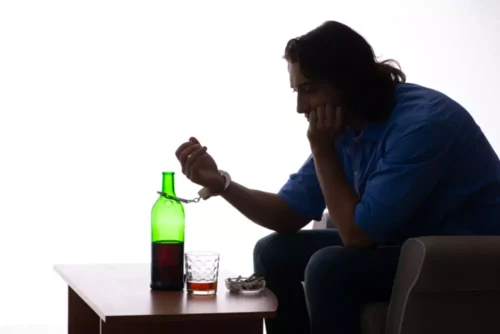Has quitting booze become the new clean eating?

A 2023 Canadian study found that even low levels of alcohol consumption can raise the risk of mortality. Additionally, a study published in the journal Nature in March 2022 suggested that consuming one glass of alcohol per day may lead to brain shrinkage. They may have stopped drinking, but their life may be exactly the same, leading them to be jealous of others who are drinking or to struggle with emotional or mental health issues. However, even if you are not experiencing these types of negative outcomes from alcohol use, heavy drinking can affect your life in a number of detrimental ways in both the short- and long-term. Light drinkers tend to be mostly spared from the effects on the liver, but for heavy drinkers, the liver becomes inflamed, which can be dangerous over time,” says Dr. Mosquera.

Emotional Sobriety
I stopped drinking in January to help me understand the role alcohol played in my life. Previous research found that one in five higher earners drinks alcohol at least five days a week. Sure, people might be more likely to divulge secrets after a few glasses of wine — but they’re also likely to blurt out something they don’t really mean and will regret the next https://ecosoberhouse.com/ morning. The effects of alcohol on the mind are simply too complex to have a black-and-white effect on honesty. If you live in one of the states (plus Washington, D.C.) where recreational marijuana is legalized, you may be interested in checking out the trend. First up, check your state’s cannabis laws to make sure you’re in the know about what’s allowed.
What Are the Benefits of Sobriety from Alcohol?

You might also consider joining a support group, attending sober curious events, or visiting a sober bar or coffee shop. From tailgating at sporting events and celebrating weddings to attending happy hours and networking events, we celebrate many of life’s greatest events with champagne, wine, beer, and cocktails. If you’re ready to start on your path toward sobriety, American Addiction Centers (AAC) can help. Alcohol.org is a subsidiary of AAC, a nationwide provider of addiction treatment centers offering a combination of proven therapies and services to meet your individual needs.
Sober For the Time Being
You might even feel like they’re taking a step backward, not forward. But remember that this phase is a fairly normal part of recovery, and it won’t last forever. The important thing is to find a recovery program that works for you and stick with it. If one approach doesn’t feel right, take a step back and consider a different one. Instead, focus on taking small steps to build some of them into your routine.
There’s no one-size-fits-all approach to stopping alcohol use and treating alcohol misuse, but no matter how severe the issue may seem, recovery is possible for every person. Whether it’s for health, relationship, financial, or any number of reasons, consider creating a list on your phone of the reasons why you want to get and stay sober. Set a reminder once or twice a day to look through your list and share it with a supportive person in your life if you feel comfortable. Developing a structured routine can help a person stick to their sobriety goals, make healthy decisions, and reduce the likelihood of triggers and relapse.
Usually, when you notice your alcohol intake is getting out of hand, you decide to take a break and return to your usual habit the next month. As for sobriety, it’s a long process where you make a decision never to drink again in your life. If you quit drugs or other substances but continue to drink alcohol in moderation, you are called clean but not sober. If you are planning to get sober for life, you should seek help from a professional. Avoid doing it on your own, or at least inform your family and friends so that they can help you in the right way. It is a big milestone that requires all your strength and patience.

His commitment to sharing stories of hope and resilience has established him as a credible and respected figure in the addiction treatment community. Physical health can improve in both sobriety and abstinence, but sobriety often involves a more comprehensive approach to health. This includes not just abstaining from substances but also adopting healthier lifestyle choices like regular exercise, balanced nutrition, and stress management. Abstinence is the complete cessation or avoidance of the substance or behavior to which one is addicted. This means not partaking in the addictive substance (like drugs or alcohol) or engaging in the addictive behavior (such as gambling or binge eating) at all.
Sober curiosity often begins with some concern about alcohol’s impact on your life. It usually involves some questioning of drinking culture and your own patterns of alcohol use. Month-long sobriety challenges like Sober October and Dry January have encouraged people to reevaluate their alcohol use. Some also try to break habits sober alcohol meaning like drinking without thinking or drinking socially just because everyone else does. In this article, we’ll provide a comprehensive guide to understanding and navigating sobriety. It aims to offer insights into the benefits of a sober lifestyle and share the resources and support systems available to those pursuing sobriety.
Build Healthy Relationships
- I stared at the ceiling with a pit in my stomach, a void in my soul, a dead cell phone battery, and an inner knowing that I would never let myself feel this way again.
- Sobriety may refer to being clear of immediate or residual effects of any mind-altering substances.
- Excessive drinking can adversely affect the brain in the long run.
- Along with facing new challenges, like working from home or not being able to see loved ones, you may have also noticed an uptick in feelings of boredom, loneliness, or anxiety.
- People in recovery can experience a lot of shame simply for having become addicted in the first place.
- Today, I will be open to giving and receiving the healthiest love possible.
After that first month, you start seeing more positive health benefits of sobriety. Your cravings are manageable, especially if you’ve figured out ways to replace alcohol with solid alternatives. With a decade of experience in producing content for drug rehabilitation centers, Ben has developed a deep understanding of the challenges and triumphs in this sphere. In 2019, he founded the video blog “A String Of Hope,” a platform that has become a beacon of inspiration and positive change for individuals seeking recovery, reaching millions worldwide. As someone who is personally journeying through recovery, Ben’s work is not only rooted in professional knowledge but also enriched by his own experiences.
- The most helpful activities are often ones that you know provide meaning, enjoyment, or a sense of mastery.
- For some, sobriety means complete abstinence from all substances, including alcohol, drugs, and sometimes even nicotine and caffeine.
- If you find it difficult to avoid alcohol despite your best efforts, a good next step might involve reaching out to a professional who specializes in recognizing and treating alcohol dependence.
- First up, check your state’s cannabis laws to make sure you’re in the know about what’s allowed.
A Step Towards Building Better Relationships
Consider bringing your own beverage, deciding ahead of time what you’ll drink when meeting at a restaurant or bar, or choosing to stick to snacks. Aside from helping you better understand your relationship with alcohol, taking a month-long break from alcohol offers more than a few benefits. This impact may be fairly insignificant, as not everyone who drinks has a problem with alcohol use, according to Cyndi Turner, LCSW, LSATP, MAC. Whether you join a fundraising challenge or not, the key is using the month to take a closer look at the impact of alcohol on your life.

Leave a Reply
Want to join the discussion?Feel free to contribute!